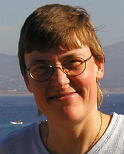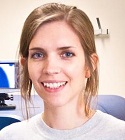The following instructors and speakers have agreed to contribute their expertise to the success of Buck Institute Course:
 |
Birgit Schilling, Ph.D. Birgit is the Director of the Mass Spectrometry and Chemistry Core at the Buck Institute for Research on Aging in Novato, CA. Research projects include investigations of neurodegenerative diseases, aging, cancer, mitochondrial damage, protein posttranslational modifications including acetylation in bacteria, the role of surface glycoconjugates in bacterial pathogenesis etc., but also mass spectrometric method development. Birgit has worked in the field of protein quantitation to assess differential protein expression or changes in posttranslational modifications, particularly using selected reaction monitoring stable isotope dilution mass spectrometry (SRM-SID-MS), and other chemical and metabolic labeling quantitative workflows, i.e., iTRAQ and SILAC technologies. Birgit has participated in large multi-laboratory SRM verification studies taking advantage of Skyline’s platform independent features. In recent years, she has used more and more label free protein quantitation approaches to investigate discovery mass spectrometric data sets (Skyline MS1 Filtering), as well as newer quantitative workflows, such as high resolution data-independent acquisitions (SWATH and PRM). Birgit has co-developed some algorithms for the Skyline Tool Store and she also extensively uses the interactive data sharing features of the Panorama webserver. |
|
 |
Michael J. MacCoss, Ph.D. Mike became interested in biomedical applications of mass spectrometry while working in Dr. Patrick Griffin’s protein mass spectrometry lab at Merck Research Laboratories. He obtained a Ph.D. with Professor Dwight Matthews and pursued a postdoc with Professor John R. Yates III. In 2004 he started the MacCoss lab at the University of Washington and it became obvious that while mass spectrometry data could be collected quickly and robustly, the lack of computational tools for the visualization and analysis of these data was a stumbling block. In 2009 he recruited Brendan MacLean with the goal of developing professional quality software tools for quantitative proteomics. Mike has worked closely with the Skyline development team and our outstanding group of laboratory scientists and collaborators to ensure that our software uses analytical approaches that have been thoroughly vetted by the mass spectrometry community. |
|
 |
Brendan MacLean Brendan worked at Microsoft for 8 years in the 1990s where he was a lead developer and development manager for the Visual C++/Developer Studio Project. Since leaving Microsoft, Brendan has been the Vice President of Engineering for Westside Corporation, Director of Engineering for BEA Systems, Inc., Sr. Software Engineer at the Fred Hutchinson Cancer Research Center, and a founding partner of LakKey Software. In this last position he was one of the key programmers responsible for the Computational Proteomics Analysis System (CPAS), made significant contributions to the development of X!Tandem and the Trans Proteomic Pipeline, and created the LabKey Enterprise Pipeline. Since August, 2008 he has worked as a Sr. Software Engineer within the MacCoss lab and been responsible for all aspects of design, development and support in creating the Skyline Targeted Proteomics Environment and its growing worldwide user community. |
|
 |
Brad Gibson, Ph.D. Brad is currently Director, Discovery Attribute Sciences at Amgen, South San Francisco, CA. After finishing his Ph.D. in protein chemistry and mass spectrometry in Klaus Biemann's group at MIT in 1983, he worked in the lab of Dr. Dudley Williams at Cambridge University as a postdoctoral fellow before joining the faculty at the University of California, San Francisco. At UCSF, his group pioneered studies in the structure and function of bacterial glyconjugates, developed the first protein crosslinking strategy for determining protein tertiary structure, and continued studies to advance protein mass spectrometry. After joining the Buck Institute in 2000, Brad's responsibilities included developing new workflows in proteomics and glycomics, setting up both internal and external collaborations with academic and industry scientists, and in acquiring new instrumentation to maintain a state-of-the-art facility. Brad joined Amgen in May of 2016. |
|
 |
Jarrett Egertson, Ph.D. Jarrett is a postdoctoral researcher at the University of Washington Department of Genome Sciences. He works in the MacCoss Lab and primarily focuses on developing new data acquisition methods and software in support of these methods. Jarrett earned his undergraduate degree (B.S. in Molecular, Cell, and Developmental Biology) from UCLA in 2008. While earning his undergraduate degree, Jarrett researched at the Spielberg Family Center for Applied Proteomics at the Cedars-Sinai Medical Center. |
|
 |
Ruth Huttenhain, Ph.D. Ruth Huttenhain did her PhD with Prof. Ruedi Aebersold at the Institute of Molecular Systems Biology, ETH Zurich, where she has been developing targeted mass spectrometric approaches and applied them to the verification of plasma-based biomarkers for ovarian cancer. In 2013 Ruth joined the lab of Prof. Nevan Krogan at University of California San Francisco as a Postdoctoral Scholar. Ruth's current research focuses on investigating dynamics of protein-protein interactions in the context of HIV infection and GPCR signaling. Therefore, she uses a combination of affinity purification and proximity biotinylation approaches coupled to quantitative mass spectrometry. |
|
 |
Hannes Röst, Ph.D. Hannes studied Biochemistry and Computational Biology at ETH Zurich (Switzerland). After completing his Masters in Computational Biology in August 2010, Hannes joined the lab of Ruedi Abersold at the Institute of Molecular Systems Biology, ETH Zurich. During his PhD, Hannes has been applying computational and statistical methods to investigate targeted proteomics strategies and their application to produce highly consistent and reproducible protein measurements across many samples. He has contributed to multiple software projects aimed at improving the theoretical understanding of targeted proteomics through simulation, provided high-throughput analysis pipelines for proteome-wide targeted proteomics experiments and developed alignment algorithms for targeted proteomics data. His current research aims to use mass spectrometric methods to perform personalized, longitudinal studies on human subjects, which he pursues as a postdoctoral scholar in the lab of Mike Snyder at Stanford University. |
|
 |
Olga Schubert, Ph.D. Olga did her Ph.D. in the group of Prof. Ruedi Aebersold at ETH Zurich (Switzerland). There, she developed experimental resources and computational strategies required to comprehensively and accurately quantify all expressed proteins of the human pathogen Mycobacterium tuberculosis using targeted proteomics. Olga established a strategy to build comprehensive, high-quality assay libraries for SRM/MRM and SWATH MS. She also developed an approach to estimate absolute protein concentrations for entire proteomes based on SWATH MS data. Her work has been awarded the SwissTB Award and the first prize at the Early Career Researcher Competition of the Human Proteomics Organization. Currently, Olga is a postdoctoral fellow at UCLA where she investigates the genetic influences on protein abundance in yeast and human cells. |
|
 |
Vagisha Sharma Vagisha got involved with proteomics at UC San Diego where she worked with Prof. Vineet Bafna. During that time she built her first tools for visualizing Mass Spectrometry data while working at ActivX Biosciences. Since moving to Seattle Vagisha has worked on Mass Spectrometry pipelines for the Aebersold group at the Institute for Systems Biology, and developed a data management system while at the University of Washington Proteomics Resource and the Yeast Resource Center. She joined the Skyline team in October 2011 where she has been the lead developer for the Panorama Targeted Proteomics Knowledge Base. |
|
 |
Tsung-Heng Tsai Tsung-Heng is a postdoctoral research associate in the lab of Olga Vitek at Northeastern University. He is a co-developer of MSstats, an open-source software package for statistical analysis of quantitative proteomic experiments. Tsung-Heng holds a PhD in Electrical Engineering from Virginia Tech. His current research focuses on developing statistical and computational methods for mass spectrometry-based proteomics. |
|
![[Need photo]](/labkey/_webdav/home/software/Skyline/events/2016%20Buck%20Institute%20Course/%40files/Verschueren.jpg) |
Erik Verschueren, Ph.D. Erik currently works in the Discovery Proteomics group at Genentech as a Bioinformatics Scientist. He previously worked at the CRG in Barcelona, Spain and the Krogan lab at University of California San Francisco. Erik’s research focuses on protein interaction networks and post-translational regulation patterns. He also develops computational methods in R for the analysis of high-throughput Affinity Purification Mass Spectrometry datasets, quantitation of differential post-translational modifications and integration of multiple ‘omics datasets into network models. |